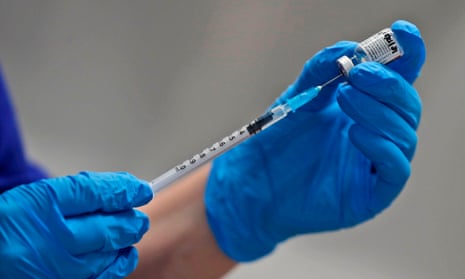Vaccine passports, which would allow people with immunity to Covid to prove they were at low risk of spreading the disease, are being investigated by companies and countries around the world. But the proposals have also raised fears among critics that they could underpin an oppressive digital ID system, and put sensitive medical records in the hands of authorities and employers.
Despite the name, a vaccine passport is not a piece of paper; instead, in the most developed versions of the idea, it is an app or similar system that can prove the bearer has been vaccinated, tested positive for Covid antibodies, or recently received a negative test. There would be no need to build and operate a privacy violating centralised database.
The pressures on such a system are similar to those faced by the NHS in building its contact-tracing app. A centralised system, which simply keeps a database of people who have been vaccinated and allows them to grant access to others, may be easiest to build, but poses unacceptable privacy burdens. Instead, one proposed system, developed by two British firms, Mvine and iProov, would be secured with a biometric identifier, preventing the records from being accessed without the bearer’s consent.
“This kind of technology enables the medical professional administering the vaccination to create the online certificate using a phone or tablet, and then to ask the user to have a selfie added to their electronic certificate,” says Andrew Bud, the founder and chief executive of iProov. “The certificate does not need to include the name, address, NHS number or any other identifying information about the person – it is completely anonymous.”
Bud envisions such passports being used in a variety of situations. “Travel is the obvious example,” he says. “Paper vaccination certificates have been a feature of travel to some countries for many years. This kind of digital vaccination certificate may well be needed for travel abroad in future. Aside from travel, employers may decide that access to offices is only safe if an employee or a visitor has one. Universities might make the same choice.”
Mvine and iProov are moving into the testing phase of their app, which received £75,000 startup funding from the UK government last year. But the Department of Health and Social Care (DHSC) says it has no plans to introduce a vaccine passport nationwide. A spokesperson says: “At this stage of the vaccination programme, it is not clear whether vaccines will prevent transmission. As large numbers of people from at-risk groups are vaccinated, we will be able to gather the evidence to prove the impact on infection rates, hospitalisation and reduced deaths. If successful, this should in time lead to a reassessment of current restrictions.”
The UK companies are not the only ones working on a solution. A coalition of American organisations, including Microsoft, Oracle and the Mayo Clinic, has launched the Vaccination Credential Initiative, aiming to establish wider standards to prevent individuals falsely claiming they have been vaccinated.
Separately, the DHSC has contracted out its own investigation of a similar proposal for test passports, which would allow individuals to prove they had received a negative test. Contracts for £34,000 and £42,000 were granted last year to two London-based companies, the Hub and Netcompany, to build a “minimum viable product”.
Civil liberties organisations are alarmed about the project. “Vaccine passports would create the backbone of an oppressive digital ID system and could easily lead to a health apartheid that’s incompatible with a free and democratic country,” says Silkie Carlo, director of Big Brother Watch. “Digital IDs would lead to sensitive records spanning medical, work, travel, and biometric data about each and every one of us being held at the fingertips of authorities and state bureaucrats.
“This dangerous plan would normalise identity checks, increase state control over law-abiding citizens and create a honeypot for cybercriminals.”
But despite the opposition, such schemes are gaining support. The owner of Pimlico Plumbers, based in London, intends to require workers to have been vaccinated before they are sent on jobs, while Unilever hopes to “encourage” all of its employees to take up the vaccine. Qantas has said it may require vaccinations for those flying, while some Australian employers could legally order their employees to be vaccinated.
